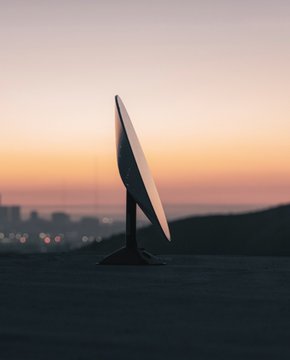SpaceX Starlink
More details are emerging about Elon Musk’s Starlink. You may want to install one of these (from SpaceX) on your nearby koppie:

It appears they will supply a dish to Beta users who sign up for the test period. Cost of dish/antenna is not yet clear. Charge for internet usage is around $149 per year. That’s about R2.5k pa or R210 pm. A dish on a high koppie (with a much smaller dinner plate sized) node pointing at a receiver on a high point, for example on the roof of a dwelling, will enable 1GB/Sec download (eg an an entire 90 min Hollywood feature movie inside three minutes).
SO WHAT … is NEW? Some answers:
- Simplicity
- Savings
- Unforeseens
Simplicity
Elon Musk wants everyone to have internet. For a start, there is no such thing as a Tesla car without internet. They get, and need, updates almost constantly. So Musk says these Starlink antennae will not need specialists to install them. Anyone will be able to.
Secondly, Tesla sells roofing tiles that collect solar electriciy, and batteries that store it. This will become more common. In South Africa, that means (since Eskom has largely killed itself of as a trustworthy supplier) more and more farmers are going to wean their farms off Eskom, at least in terms of supply to their dwellings. The first thing a criminal wants is to disable your power so you can’t get help, so generating your own at your house rules out the bad guys cutting off supply from down the road somewhwere.
Simple electricity and internet installations are the way to go, and DIY power generation will become the norm on farms where 3-phase is not needed for heavy machinery plants.
Savings
In our rural situation, this means that any farmer can have very (rather unbelievably) fast internet access for the same price or less than now. We will stil need people to climb koppies to erect things, but they won’t need to be tech-savvy digital experts.
Some geeky farmers may want to make money by becoming IPs (Internet Providers) for their neighbours. That is, if they wish to kiss their sleep goodbye, because there is no such thing as a trouble-free connection, and users want what they want! Typically, an IP supplies one or more email addresses, and space on a server to store those emails. Some will also host a website for a fee.
Unless one considers the option of the currently very expensive available satellite internet options, Internet has had to be beamed from a copper (think ADSL) or fibre connection, and those are usually found only in towns. Starlink is the first reasonably priced option to share internet cheaply, rurally.
Unforeseeables
Who knows what people will cook up? There will be far easier and cheaper IoT (Internet of Things), including much easier and better feedback from:
- cameras at gates, game areas
- water level sensors at drinking points in livestock camps, or JoJo tanks, saving enormous amounts of fossil fuel
- any other sensors (meat freezer rooms?)
- on-farm communications
- moisture content of crop soils (and automatic watering)
There will be possibilities, for hobbies or home industry, with 3D printing - people will download plans for plastic things like:
- light fittings,
- toys & figurines
- musical instruments (guitar, flute)
- covers for tablets and phones
- gear lever tops and door fittings for cars
- aqua- and hydroponics parts and spares
There will also be new or better opportunities for :
- farm-stay working (especially in pandemics as right now)
- rural networking and couriers
- shopping (email and fetch), pop-up shops, spazas
- home schooling
- cultural & eco tourism (What3Words will allow every tiny rock carving or painting to be easily located, once identified on the app)
And more …
Think of a phone, filming a herd of sheep urged through a race for counting. Send the film to us on the stoep! Or in our car! Counting sheep is difficult, but we can step through it counting the sheep slowly and carefully (there are apps for that … an Australian app counts a whole herd of sheep from a drone flying above the flock).
With very fast internet, it will be easier (as people are doing in the pandemic) to perform gigs from home, even together with musicians on the other side of the world, again saving time in cars and thus lots of fossil fuel (not to mention lives: over the big years of live music, 8% of our perfomers lost their lives in motor accidents).
Music venues relying on liquor sales will may shrink or disappear … but lounge concerts will be back (and beamed across the world)!